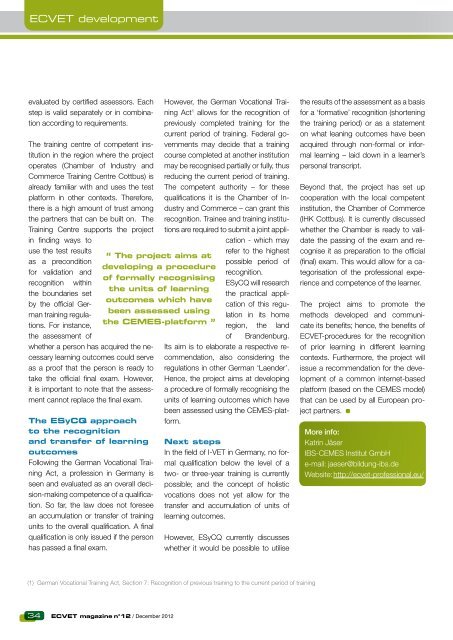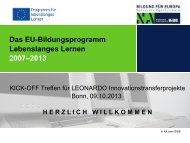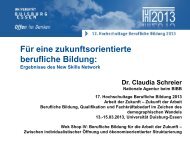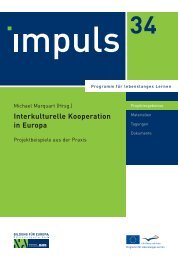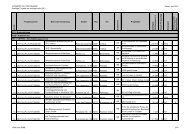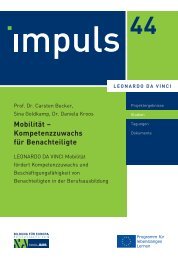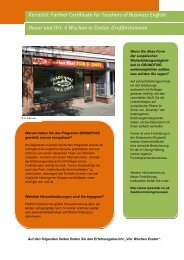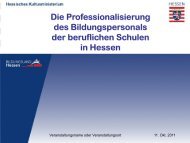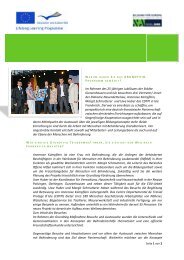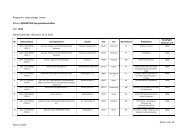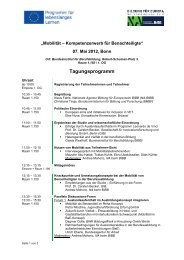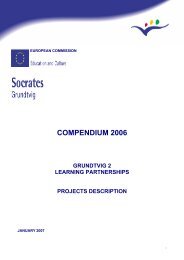Create successful ePaper yourself
Turn your PDF publications into a flip-book with our unique Google optimized e-Paper software.
ECVET development<br />
evaluated by certified assessors. Each<br />
step is valid separately or in combination<br />
according to requirements.<br />
The training centre of competent institution<br />
in the region where the project<br />
operates (Chamber of Industry and<br />
Commerce Training Centre Cottbus) is<br />
already familiar with and uses the test<br />
platform in other contexts. Therefore,<br />
there is a high amount of trust among<br />
the partners that can be built on. The<br />
Training Centre supports the project<br />
in finding ways to<br />
use the test results<br />
as a precondition<br />
for validation and<br />
recognition within<br />
the boundaries set<br />
by the official German<br />
training regulations.<br />
For instance,<br />
the assessment of<br />
whether a person has acquired the necessary<br />
learning outcomes could serve<br />
as a proof that the person is ready to<br />
take the official final exam. However,<br />
it is important to note that the assessment<br />
cannot replace the final exam.<br />
The ESyCQ approach<br />
to the recognition<br />
and transfer of learning<br />
outcomes<br />
Following the German Vocational Training<br />
Act, a profession in Germany is<br />
seen and evaluated as an overall decision-making<br />
competence of a qualification.<br />
So far, the law does not foresee<br />
an accumulation or transfer of training<br />
units to the overall qualification. A final<br />
qualification is only issued if the person<br />
has passed a final exam.<br />
“ The project aims at<br />
developing a procedure<br />
of formally recognising<br />
the units of learning<br />
outcomes which have<br />
been assessed using<br />
the CEMES-platform ”<br />
However, the German Vocational Training<br />
Act 1 allows for the recognition of<br />
previously completed training for the<br />
current period of training. Federal governments<br />
may decide that a training<br />
course completed at another institution<br />
may be recognised partially or fully, thus<br />
reducing the current period of training.<br />
The competent authority – for these<br />
qualifications it is the Chamber of Industry<br />
and Commerce – can grant this<br />
recognition. Trainee and training institutions<br />
are required to submit a joint application<br />
- which may<br />
refer to the highest<br />
possible period of<br />
recognition.<br />
ESyCQ will research<br />
the practical application<br />
of this regulation<br />
in its home<br />
region, the land<br />
of Brandenburg.<br />
Its aim is to elaborate a respective recommendation,<br />
also considering the<br />
regulations in other German ‘Laender’.<br />
Hence, the project aims at developing<br />
a procedure of formally recognising the<br />
units of learning outcomes which have<br />
been assessed using the CEMES-platform.<br />
Next steps<br />
In the field of I-VET in Germany, no formal<br />
qualification below the level of a<br />
two- or three-year training is currently<br />
possible; and the concept of holistic<br />
vocations does not yet allow for the<br />
transfer and accumulation of units of<br />
learning outcomes.<br />
However, ESyCQ currently discusses<br />
whether it would be possible to utilise<br />
(1) German Vocational Training Act, Section 7: Recognition of previous training to the current period of training<br />
34 ECVET magazine n°12 / December 2012<br />
the results of the assessment as a basis<br />
for a ‘formative’ recognition (shortening<br />
the training period) or as a statement<br />
on what leaning outcomes have been<br />
acquired through non-formal or informal<br />
learning – laid down in a learner’s<br />
personal transcript.<br />
Beyond that, the project has set up<br />
cooperation with the local competent<br />
institution, the Chamber of Commerce<br />
(IHK Cottbus). It is currently discussed<br />
whether the Chamber is ready to validate<br />
the passing of the exam and recognise<br />
it as preparation to the official<br />
(final) exam. This would allow for a categorisation<br />
of the professional experience<br />
and competence of the learner.<br />
The project aims to promote the<br />
methods developed and communicate<br />
its benefits; hence, the benefits of<br />
ECVET-procedures for the recognition<br />
of prior learning in different learning<br />
contexts. Furthermore, the project will<br />
issue a recommendation for the development<br />
of a common internet-based<br />
platform (based on the CEMES model)<br />
that can be used by all European project<br />
partners.<br />
More info:<br />
Katrin Jäser<br />
IBS-CEMES Institut GmbH<br />
e-mail: jaeser@bildung-ibs.de<br />
Website: http://<strong>ecvet</strong>-professional.<strong>eu</strong>/


